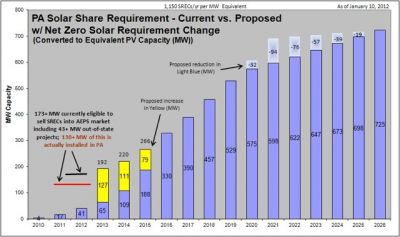Is PA business group’s fight against solar bill unfounded?

The Pennsylvania Chamber of Commerce is fighting against HB 1850, which would expand the Keystone State’s solar renewable energy credit (SREC) program moderately to help stabilize the state’s solar industry. In its opposition the group claims the legislation could cost Pennsylvanians and businesses $1 billion. A figure that the Pennsylvania Solar Energy Industries Association (PASEIA), which is hoping for a vote on the bill before the legislature concludes its session, roundly disputes.
The legislation was written in response to steep decline in the value of SRECs, which certain pollution emitters in Pennsylvania are required to purchase to offset their emissions. Recently, because of the popularity of solar more installations were completed than expected, dropping the price of SREC credits. The credits were leveraged by solar to reduce the costs of going solar. But with low values, the incentive to go solar is reduced, which stymies the industry.
Under Pennsylvania's Alternative Energy Portfolio Standards Act half of a percent of electricity in the state must come from solar by 2020, according to Central Penn Business Journal. The legislation would accelerate the amount of SRECs that utilities and others must purchase over the next three years, from 0.051 percent now to 0.214 percent in 2015, the newspaper said.
The business group alleges the the legislation would add as much as $100 million to energy costs annually over the next decade. “There is no way possible that the incremental cost of HB1580 could be anywhere close to $1billion,” exclaimed PASEIA president Ron Celentano. Citing Bloomberg New Energy Finance figures, he said regardless of the HB 1580, the max incremental cost would be less then $7 million annually. “Assuming high SREC prices, the total incremental cost of implementing HB1580 is about $48 million or about a 2 cents/month bill increase for residential customers.
PASEIA lobbyist Maureen Mulligan said the business group has not explained how they came up with the $1 billion figure. “They are still fighting the original AEPS and they bundle the costs associated with that as a short-cut to real analysis of the bill’s impact,” she said.
The organization was hoping for a vote as soon as today (June 6), but didn’t get it yet. “The House is in all next week so we still have time before they leave for the summer if they vote early next week. Leadership is holding up the bill,” Mulligan said. She attributed the holdup to largely to Representative Mike Turzai. “That’s largely because of the opposition from the PA Chamber of Commerce.”



